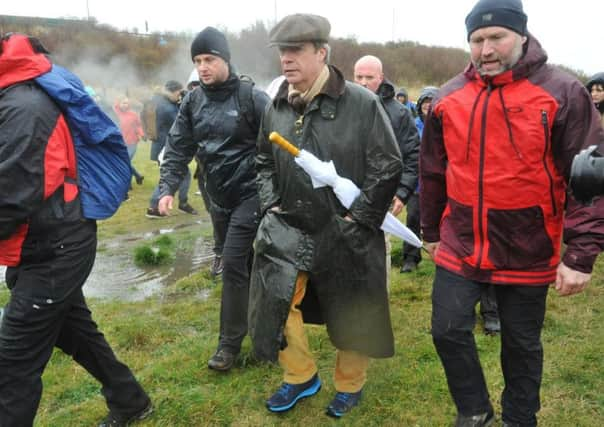‘Why National Trust was right to ban Nigel Farage’s Brexit march from its properties’


Leave supporters flooded onto social media to say they were cancelling their memberships, while Remainers praised the decision by posting celebratory messages such as “Hooray! Another slap in the face for Farage!”
Advertisement
Hide AdAdvertisement
Hide AdThe irony of the situation being used for political point-scoring by the opposing sides is that the National Trust said its decision had been taken as they wanted to preserve their status as an “apolitical” organisation. But this is far from the first time the Trust has found itself at the centre of a political row - with everything from its approach to Easter eggs to gay pride badges drawing controversy in recent years.
There have been undoubted (even if well-intentioned) missteps in the past but with the Brexit march decision putting the Trust back in the headlines once again, it is worth examining the exact circumstances of what happened on this occasion.
The March to Leave group, involving dozens of pro-Brexit supporters accompanied by a bus and coach, had planned to use a car park at Fountains Abbey in North Yorkshire on March 19 as a meeting place for a leg of their walk. Organisers Leave Means Leave posted a message to their 57,000 Twitter followers the day before encouraging people to join them at the site - and giving the meeting point as a car park clearly described on the Fountains Abbey website as being reserved for disabled visitors and those with young families.
After the plan was highlighted to the Trust, they responded to say they had not given their consent for the gathering to happen. The march organisers then changed their official meeting point to public land nearby - but Trust officials said some supporters of the demonstration still parked in the disabled car park and had to then be asked to move their vehicles.
Advertisement
Hide AdAdvertisement
Hide AdMarchers had been planning to use another Trust property, Nostell Priory near Wakefield, as a meeting place for another leg of the walk on March 21 - but changed their plans to instead use a nearby pub car park as a result of the previous problems. The Trust said it had not been contacted by the organisers about using Nostell, but if they had would not have agreed to it or other properties being used for a “political event”.
The replacement meeting point, outside a pub in nearby Ackworth, subsequently became the venue for heated exchanges between Leave supporters and a small group of Remain-backing counter-protesters - rather vindicating the Trust’s stance.
In the circumstances, the Trust’s reasoning looks entirely sound. Having apparently not being contacted by the organisers of a political demonstration about the intended use of their land, they decided they did not wish to welcome a controversial event that had already proved disruptive to ordinary visitors.
We cannot know if they would have applied the same standards to a hypothetical Remain march, but they would have been well within their rights to do so had the same approach being taken.
Advertisement
Hide AdAdvertisement
Hide AdThe National Trust has five million members and looks after more than 500 castles, houses and ancient monuments and 780 miles of coastline. It is precisely because of its importance to national life that it often becomes something of a lightning rod for debates about changing British values.
Witness the furious row that broke out in 2017 when its Cadbury-sponsored Easter egg hunts were rebranded as ‘Great British Egg Hunts’ - a decision that became the starting point for a national debate about Christianity’s declining influence in British society. The move was branded as ‘absolutely ridiculous’ by Prime Minister Theresa May, a vicar’s daughter and National Trust member. The Trust subsequently reinstated the word Easter to advertise its egg hunts last year and has continued to do so this year.
Similar controversy followed later in 2017 when volunteers working at a Norfolk stately home were initially banned from public duties if they refused to wear rainbow gay-pride badges to mark 50 years since homosexuality was legalised. It led to strong criticism of the Trust from Sir Roy Strong, a former director of the National Portrait Gallery, who claimed successive “left-leaning” director-generals had left it acting “like the Blair government in exile”, then National Trust head Dame Helen Ghosh admitted that some “traditional visitors” felt they were not being catered for as well as in the past.
But as current director general Hilary McGready told the BBC last year when asked about past controversies; “The reality is, with five million members, somebody somewhere is likely to be annoyed with us. If people are not passionate about the trust, then it’s a sad day.”
Chris Burn is assistant features editor of The Yorkshire Post.